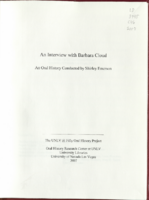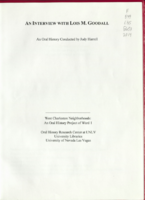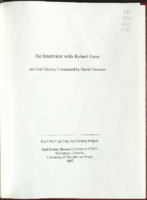Search the Special Collections and Archives Portal
Search Results

Larry Mason interview, September 14, 2018: transcript
Date
Archival Collection
Description
Interviewed by Nathalie Martinez. Larry Mason is an Arizona native that moved to Las Vegas as a Higher Education Administrator. He was born in Tuscon, Arizona, but grew up mostly in East Los Angeles and his "Gramitas" ranch in Sonora, Mexico. He has a history in athletics as a basketball player in his upbringing which brought him to play at the New Mexico Highlands University and the European League. Earning a Masters in Education, Larry Mason came to Las Vegas to become the first Latino Director of Admissions at UNLV, first Latino President of the Board of Education, and first Latino Vice President of the Board of Education in the Clark County School District. He launched an incredible amount of movements within the educational field in Las Vegas including (but not limited to): the Mariachi program, the magnet school program, and the growth of the Diversity Division within the NSHE. Some of his greatest supporters and allies included Senator Harry Reid, John Lujan and Tom Rodriguez. Mason continues to work as a community leader for minority representation in STEM fields, as a board member for the Nevada STEM Coalition.
Text

Rosemary Q. Flores interview, October 16, 2018, October 29, 2018: transcript
Date
Archival Collection
Description
Session 1: Interviewed by Elsa Lopez. Rosemary's parents originated from Sonora, Mexico where her father worked in the strawberry fields and her mother was a kindergarten teacher. Her father, in search for a better life, came to Nevada after he heard of jobs available in the Northern Nevada mines. The two met and settled down in Reno after her mother became enamored with the beauty of Lake Tahoe. Rosemary and her four younger siblings grew up in Reno with their parents until the divorce. Her father soon joined the army during the Korean war and felt that it would be best if Rosemary and her siblings lived with their grandmother back in Mexico. There they stayed for two years, and although she missed her family and did not speak much Spanish, she recalls her time there with fondness. She eventually moved back to Reno and finished high school, graduating in the top 20. She married afterwards and had her son as well. After some convincing from her husband, Rosemary enrolled into the University of Nevada, Reno and graduated with a major in Secondary Education with a specialty in Physics and Math. Rosemary became further involved in community outreach and non-profit programs such as Founding Hispanic Youth Image, Co-founding ALITAS, being a board member for the Title XX Commission, and being a Chair for the Latino Youth Leadership Conference. She has two children and is currently working at UNLV with the program Multicultural Education Services Alliance (MESA) as a Family Engagement Specialist. Subjects: Reno Nevada, UNLV, Multicultural Education, Family Engagement, Activism; Session 2: Interviewed by Elsa Lopez. This is a continuation of a previous interview. We have asked Rosemary Q. Flores to tell us more about her work in the Multicultural Education Services Alliance. We also spoke more about her family and early childhood in Mexico while she was away from her family.
Text

Mauricia Baca interview, December 16, 2019: transcript
Date
Archival Collection
Description
Interviewed by Elsa Lopez and Claytee White. Mauricia Baca, Director of Get Outdoors Nevada, was born to a Jewish American mother and Mexican father who settled in New York City. She overcame the economic obstacles of her early life to graduate from Vassar College and University of New York Law School, where she learned to be proud of her identity. Subjects: Jewish, Education, Law School, Latinx, Mexican
Text

Transcript of interview with William Carlson by Alice Brown, March 19, 1980
Date
Archival Collection
Description
Text

Transcript of interview with Barbara Cloud by Shirley Emerson, May 30, 2006
Date
Archival Collection
Description
Text

Transcript of interview with Lilly Fong by Annie Yuk-Siu Shum, February 29, 1980
Date
Archival Collection
Description
Text

Transcript of Lois M. Goodall by Judy Harrell, November 12, 2013
Date
Archival Collection
Description
Text

Transcript of interview with Robert Gore by David Emerson, January 31, 2008
Date
Archival Collection
Description
Text

Transcript of interview with Dr. Harrie Fox Hess by Scot Siegel, February 26, 1979
Date
Archival Collection
Description
On February 26th, 1979, Scot Siegel interviewed his psychology professor, Dr. Harrie Hess (born March 1, 1929 in Hammond, Indiana) in his office at the University of Nevada, Las Vegas. Dr. Hess discusses his family’s reason for moving to Nevada and how he felt as a young adult moving to Las Vegas. The two go on to talk about Dr. Hess’ contributions to Nevada through his work as a psychologist, and briefly mentions the first law to be drafted on psychology certification in Nevada. Dr. Hess then describes the Wild Cat Lair as an important site of social recreation for early Las Vegas youth. The interview concludes with his memory of Boulder (Hoover) Dam and how he believes that workers from the Great Depression paved the way for industrial success in gambling due to their employment on the Dam.
Text

Transcript of interview with Shelley Berkley by Barbara Tabach, February 13, 2015
Date
Archival Collection
Description
In this interview, Berkley shares her family history, from her great-grandparents? immigration to the United States to her immediate family?s own migration from New York to Las Vegas. She reflects upon her childhood experience in Las Vegas, including her varied leadership positions with Jewish organizations as well as at school, from junior high school through college. Berkley also talks about her involvement as an adult within the Jewish community and more broadly as a public servant, in all levels of government.
Former United States Democratic Congresswoman Shelley Berkley represented Nevada?s 1st Congressional District from 1999 to 2013, an area that includes most of Las Vegas. During her seven terms as a member of the U.S. House of Representatives, the district benefited from millions of dollars of federal funding for education, transportation, and other projects. She also successfully fought against storing nuclear waste at Yucca Mountain in Nevada. Shelley Berkley was born Rochelle Levine in New York City in 1951 and moved to Las Vegas during junior high in 1963. She practiced law in Las Vegas and served in the Nevada Assembly for two years. She was also a member and vice chair of the Nevada University and Community College System Board of Regents. Berkley attended the University of Nevada, Las Vegas where she served as student body president and graduated with honors in 1972 with a B.A. in political science. After obtaining her J.D. in 1976 from the University of San Diego, she returned to Las Vegas to practice law. From 1976 to 1979 Berkley was Deputy Director of the Nevada State Department of Commerce. She provided legal counsel to several casinos at various points in her career, served as national director of the American Hotel-Motel Association, and founded the Southern Nevada Association of Women Attorneys and the Senior Law Project. In 1977 she married Frederic Berkley and had two children, Max and Sam. She remarried in 1999 to Dr. Lawrence Lehrner of Las Vegas, who also had two children from a previous marriage. Before being elected to Congress, Berkley served on the board of the American Israel Public Affairs Committee. She continued her vocal support of Israel in Congress and was heavily involved in all matters related to the Middle East. She was a member of several committees, including: Foreign Affairs, Veterans Affairs, Ways and Means, Small Business, and Transportation. Building a new Veterans Administration medical complex in Southern Nevada and sponsoring many pieces of healthcare legislation are also among her accomplishments as a U.S. Representative. In 2013, she was appointed CEO and Senior Provost of the Touro College and University System?s Western Division.
Text
